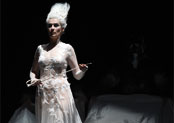OPERA SEARCH

Die Schneekönigin
(The Snow Queen) (2016)Libretto by Marius Felix Lange after Hans-Christian Andersen's fairy tale (G)
4S,2M,A,3T,Bar,BBar,B; chorus(SSAAT);
2(II=picc).2(II=corA).2(II=bcl).2(II=dbn)-4.2.2.btrbn.1-timp.perc(3):SD/BD/clash cym/susp.cym/tam-t/Chin.gong/glsp/crot/xyl/chimes/tgl/wdbl/whip-harp-cel-strings
Abbreviations (PDF)
Sikorski
Deutsche Oper am Rhein, Duisburg
Johannes Schmid, director
Conductor: Lukas Beikircher
Company: Duisburger Philharmoniker
| SNOW QUEEN | High Soprano |
| GERDA | Soprano |
| KAY | Baritone |
| FLOWER VENDOR LADY | Mezzo Soprano |
| CROW | Character Tenor |
| PRINCE | Tenor |
| PRINCESS | Soprano |
| ROBBER GIRL | Mezzo Soprano |
| REINDEER | Bass |
| GRANDMOTHER / FINNISH LAPP | Contralto |
| DEUBELTROLL | Bass Baritone |
| TÖLPELTROLL | Soprano |
| TROTTELTROLL | Tenor |
The wicked troll makes a looking-glass in which everything beautiful is small, and everything ugly is huge. When the pupils of his troll school fly toward heaven with the looking-glass, it breaks into “hundreds of millions, billions, and even more splittered splitters.” Whoever gets such a splitter in the eye of in the heart loses sight of everything beautiful, and sees only negative things.
And that is what happens to the young Kay. Just after he has played joyfully with his girl friend Gerda in the garden, and both admired their two roses, he suddenly pushes her away and taunts her maliciously. In winter he eventually follows the Snow Queen into her realm. But Gerda does not give up on him, and sets out in search of her friend. Along the way she encounters a lonely Flower Woman, a clever Crow, an amorous Prince and Princess, a self-confident Little Robber Girl, a sentimental Reindeer, and, finally, a wise Finn Woman who can tell her what happened to Kay. Gerda hurries to the palace of the Snow Queen, where she finally finds Kay, whom she can ultimately save by means of her compassion and warm-heartedness. When the two of them finally return home, they are “grown up and yet children, children at heart” – as it is said at the end of Andersen’s story.
Wow! Opera can be so beautiful, so emotional, so splendidly full of fantasy. [...] Marius Felix Lange [...] plays sovereignly with the means of contemporary music. (Armin Kaumanns, Rheinische Post from 6 July 2016)
Lange follows the model very closely and tells a story of tender poetry and fine humor without exaggerated slapstick and cramped, naive fussiness. Everything is immersed in a sound of cinematic beauty einriched with dissonant accents: musically a successful balancing act between romantic dream world and hard reality. (Pedro Obiera, Westdeutsche Allgemeine Zeitung (WAZ) from 25 April 2016)
While writing the libretto and the music to my opera “The Snow Queen,” it was my heartfelt desire to fully transfer to the opera stage the complexity of the material, its poetry, its deep symbolism, its bizarre humor, its colorful characters, and especially the touching and, in the course of the story, dramatically endangered relationship between Gerda and Kay. In doing so, I felt obligated to remain as close as possible to Hans Christian Andersen’s masterful original. In the spirit of Andersen, the work is aimed at people of all ages. (Marius Felix Lange)
Poetic, Romantic
